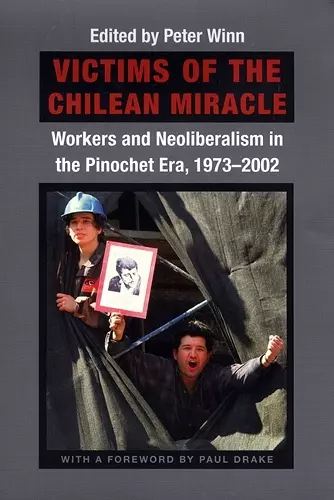Victims of the Chilean Miracle
Workers and Neoliberalism in the Pinochet Era, 1973–2002
Format:Paperback
Publisher:Duke University Press
Published:20th Jul '04
Currently unavailable, and unfortunately no date known when it will be back

An attempt to gauge the impact of Chile's neo-liberal reform policies and of the Chilean "economic miracle" on various groups of workers
Chile was the first major Latin American nation to carry out a complete neoliberal transformation. Its policies—encouraging foreign investment, privatizing public sector companies and services, lowering trade barriers, reducing the size of the state, and embracing the market as a regulator of both the economy and society—produced an economic boom that some have hailed as a “miracle” to be emulated by other Latin American countries. But how have Chile’s millions of workers, whose hard labor and long hours have made the miracle possible, fared under this program? Through empirically grounded historical case studies, this volume examines the human underside of the Chilean economy over the past three decades, delineating the harsh inequities that persist in spite of growth, low inflation, and some decrease in poverty and unemployment.
Implemented in the 1970s at the point of the bayonet and in the shadow of the torture chamber, the neoliberal policies of Augusto Pinochet’s dictatorship reversed many of the gains in wages, benefits, and working conditions that Chile’s workers had won during decades of struggle and triggered a severe economic crisis. Later refined and softened, Pinochet’s neoliberal model began, finally, to promote economic growth in the mid-1980s, and it was maintained by the center-left governments that followed the restoration of democracy in 1990. Yet, despite significant increases in worker productivity, real wages stagnated, the expected restoration of labor rights faltered, and gaps in income distribution continued to widen. To shed light on this history and these ongoing problems, the contributors look at industries long part of the Chilean economy—including textiles and copper—and industries that have expanded more recently—including fishing, forestry, and agriculture. They not only show how neoliberalism has affected Chile’s labor force in general but also how it has damaged the environment and imposed special burdens on women. Painting a sobering picture of the two Chiles—one increasingly rich, the other still mired in poverty—these essays suggest that the Chilean miracle may not be as miraculous as it seems.
Contributors.
Paul Drake
Volker Frank
Thomas Klubock
Rachel Schurman
Joel Stillerman
Heidi Tinsman
Peter Winn
“Showcasing some of the best current U.S. work on recent Chilean labor and economic history, this collection lays to rest any remaining doubts as to the partial and extremely uneven nature of the ‘economic miracle’ and its devastating impact on workers. Especially welcome are discussions of neoliberalism’s contributions to environmental degradation and its contradictory impact on working-class culture and gender relations.”—Florencia Mallon, editor of When a Flower Is Reborn: The Life and Times of a Mapuche Feminist by Rosa Isolde Reuque Paillalef
“The great strength of this volume is that it provides readers with an original, historically based, human-focused analysis of the so-called Chilean miracle.”—Brian Loveman, author of Chile: The Legacy of Hispanic Capitalism
ISBN: 9780822333210
Dimensions: unknown
Weight: 635g
448 pages